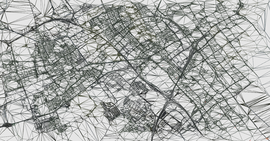TerraGear
TerraGear is a collection of open-source tools and rendering libraries which can transform publically available GIS data in 3D representations (i.e. 3D models or 3D maps) of the earth for use in real time rendering projects. TerraGear can import 3D data sets such as DEM terrain grids, 2D polygon data sets such as coastlines, city outlines, lake outlines, and 2D raster data sets such as the 1 km NAOO land use/land cover data. It also has tools for generating realistic airports, runways, and lighting based on available FAA data.
TerraGear is the primary tool used to generate the scenery for the FlightGear project.
Without terragear, it is possible to change Terrain textures but not terrain shapes. If you want to change the texture for cities, you change the materials file. If you want to change the coast line, you need terragear. Check the material files in directory FGDATA/Material. Identify the material file that includes Montevideo, which is probably latin_american_cities.xml (Howto:Regional texturing and this page Procedural Texturing[1]
Introduction
For a variety of reasons you might want to build terrain yourself, rather than downloading it from the available scenery on FlightGear. For instance, if you use WED to create or modify an airport layout, you might wish to see how that modified airport would look in the Scenery before deciding you're happy with the results. And normally, to see and use the airport in the scenery, it's necessary to submit the modifications to the FlighGear scenery staff and then wait untill the next update of the scenery of that area is available via TerraSync or in the official FlightGear Scenery build. If you can build terrain yourself, you can start using it right away.
Maybe the official scenery is too detailed for your slow machine, and you'd like to build terrain using a digital elevation model (DEM) with poorer resolution, to decrease the number of polygons and thus improve your framerates. Or maybe you've got a fantastically fast machine, and you want to build your own terrain using higher resolution vector data (vmap1, Tiger) to get better roads/rivers. For all these reasons learning how to use TerraGear is a good idea.
Getting TerraGear
Using the download_and_compile.sh script (Linux distros using apt)
Get the script download_and_compile.sh if you don't already have it. Copy it into a specific directory, no need to be root.
wget https://gitlab.com/flightgear/fgmeta/raw/next/download_and_compile.sh
mv download_and_compile.sh\?format\=raw download_and_compile.sh
chmod 755 download_and_compile.sh
./download_and_compile.sh SIMGEAR TERRAGEAR
This will build SIMGEAR (pre-requisite) and TERRAGEAR properly, installing dependencies if necessary and you will be done for the TG compilation part of the process.
Pre-compiled builds
- Latest Windows build, built by the FlightGear Build Server.
Source
The source is hold in a Git repository at SourceForge..
git clone https://gitlab.com/flightgear/terragear.git flightgear-terragear
you have to use the stable branch called "scenery/ws2.0"! https://gitlab.com/flightgear/terragear/blob/scenery/ws2.0/~
Compilation
Dependencies
- TerraGear
Building
cmake . [options] make install
cmake options:
-DCMAKE_PREFIX_PATH="/path/to/lib/install/prefix"
Platform specific
Debian
Gentoo
- emerge -av terragear
See Building Flightgear - Gentoo.
Ubuntu
GUI Tool
A TerraGear GUI is available for those that would like to use TerraGear without knowing/using the command line options.
Related content
- Using Terragear
- Howto:Use TerraGear without wanting to kill yourself
- TerraGear CORINE
- TerraGear Documentation
- TerraGear API docs
| |||||
| |||||||||||
- ↑ ludomotico (May 25th, 2017). Re: Improving terrain realism .
